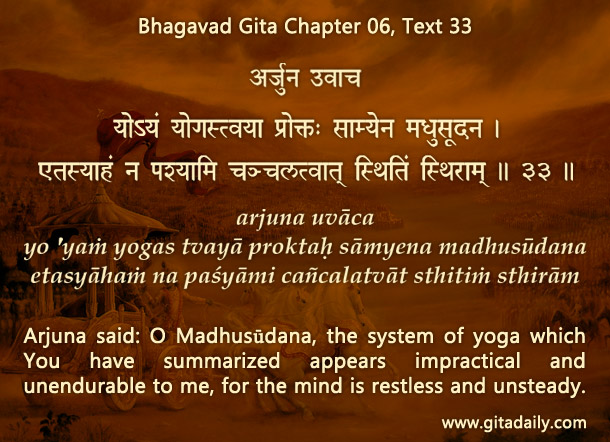In the Bhagavad-gita’s sixth chapter, Krishna outlines the process of dhyana-yoga, which centers largely on maintaining equanimity of mind. In fact, serious dhyana-yoga begins with staying steady amid various dualities (06.07-09) and eventually making the mind totally steady, like a lamp in a windless place (06.19).
On hearing about this process, Arjuna is apprehensive; such steadiness of mind seems impractical for him (06.33). In his two-verse statement (06.33-34), he doesn’t ask an explicit question; he states a concern that contains an implicit question. When Arjuna tells Krishna that the mind is extremely difficult to control (06.34), he is like a student telling a teacher, “This subject is too difficult to comprehend.”
Krishna answers (06.35) as might an expert teacher, with a judicious blend of empathy and encouragement. He first acknowledges that the mind is undoubtedly difficult to control. Then, he assures Arjuna that the mind can be disciplined by practice and detachment.
Practice: This recommendation points to the mind’s mechanical nature — it is, after all, a part of material (07.04), and it functions based on habits formed by repetition. A mind that is allowed to wander will become unmanageable, whereas a mind that is repeatedly refocused will become manageable. Throughout the Gita, Krishna describes various processes that can help focus the mind: karma-yoga, dhyana-yoga, jnana-yoga and bhakti-yoga. Here, Krishna doesn’t recommend a specific process; he prioritizes the practice that is necessary to make any process work.
Detachment: This recommendation can imply two broad things. First, we need to cultivate detachment from the things that captivate or agitate the mind. By remembering that we are souls different from our mind, we can choose to not pay undue attention to its infatuations or insecurities. Second, we need to be detached from the expectation of quick success; knowing that the mind has had a multi-lifetime habit of restlessness, we need to be ready for the long haul.
One-sentence summary:
Though managing the mind is tough, it is possible through persistent practice and discerning detachment.
Think it over:
- Why does Arjuna ask Krishna about mind management?
- What does Krishna’s recommendation of practice mean?
- What does Krishna’s recommendation of detachment mean?
***
06.33: Arjuna said: O Madhusudana, the system of yoga which You have summarized appears impractical and unendurable to me, for the mind is restless and unsteady.
To know more about this verse, please click on the image


Japa manages the MIND